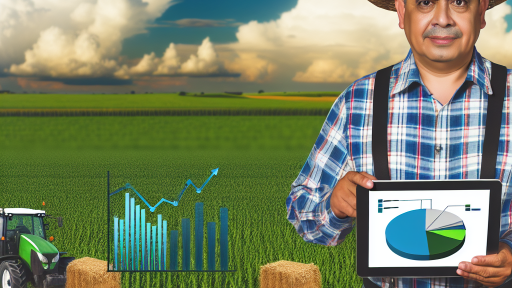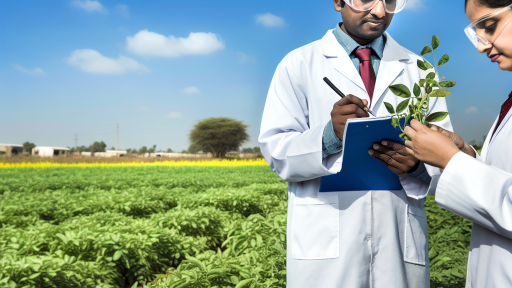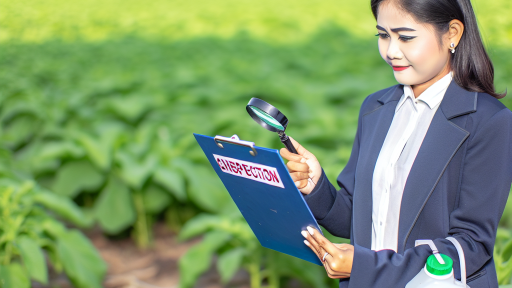Overview of Climate Challenges Faced by Agriculture
Agriculture faces significant climate challenges in today’s world.
Extreme weather events threaten crop yields and livestock health.
Increased temperatures lead to water scarcity in many regions.
Additionally, rising sea levels jeopardize coastal farmland.
Pest and disease outbreaks become more frequent with changing climates.
Farmers must adapt quickly to these shifting patterns.
Impact of Extreme Weather
Extreme weather includes droughts, floods, and hurricanes.
Drought reduces water supply, limiting irrigation options.
Flooding can destroy crops and disrupt planting schedules.
Farmers often face financial instability as a result.
Adaptation to Higher Temperatures
Higher temperatures can hinder crop growth and reduce yields.
Many plants struggle to thrive in extreme heat conditions.
Farmers may need to alter their planting dates and crop selections.
They can also adopt heat-resistant crop varieties.
Water Scarcity Issues
Water scarcity results from both climate change and overuse.
Transform Your Agribusiness
Unlock your farm's potential with expert advice tailored to your needs. Get actionable steps that drive real results.
Get StartedEfficient water management is crucial for sustainable farming.
Farmers can use techniques like drip irrigation to conserve water.
Investments in water-efficient technologies become imperative.
Threats from Pests and Diseases
Climate change alters pest behavior and distribution.
New pests may invade areas previously unaffected.
Farmers need to enhance pest management strategies effectively.
Integrated pest management can help reduce crop damage.
Coastal Agriculture Challenges
Rising sea levels pose profound risks to coastal agriculture.
Saltwater intrusion can degrade soil quality and crop viability.
Farmers must consider relocating or adapting their practices.
Resilience-building measures become essential in these regions.
Impact of Climate Change on Crop Yields and Food Security
Effects on Crop Yields
Climate change significantly affects crop yields worldwide.
Higher temperatures lead to heat stress in plants.
This stress reduces photosynthesis and overall growth.
Increased frequency of extreme weather damages crops directly.
Floods and droughts disrupt growing seasons and harvest times.
Moreover, changing precipitation patterns create uncertainty for farmers.
As a result, many regions experience decreased agricultural productivity.
Consequences for Food Security
Decreased crop yields threaten global food security.
More people face hunger and malnutrition as a result.
Food prices rise with lower supply levels, creating more challenges.
Vulnerable populations in developing countries suffer the most.
Access to nutritious food becomes limited for many families.
Additionally, food systems are under increased strain from climate impacts.
Showcase Your Farming Business
Publish your professional farming services profile on our blog for a one-time fee of $200 and reach a dedicated audience of farmers and agribusiness owners.
Publish Your ProfileAdaptive Measures and Policy Solutions
Governments must implement policies to address these challenges.
Sustainable practices can help enhance resilience in agriculture.
Research into climate-resilient crop varieties should be prioritized.
Investment in irrigation systems mitigates drought effects significantly.
Education programs empower farmers with innovative practices.
Moreover, integrating technology can streamline agricultural processes.
Incorporating climate adaptation strategies is essential for future food security.
Key Agricultural Policies Designed to Mitigate Climate Change
Promotion of Organic Farming
Organic farming reduces dependency on synthetic fertilizers and pesticides.
This method enhances soil health and promotes biodiversity.
Moreover, it helps sequester carbon in the soil.
Investment in Renewable Energy
Many policies encourage farmers to adopt renewable energy sources.
Solar panels and wind turbines can power farm operations sustainably.
Thus, these investments decrease greenhouse gas emissions significantly.
Implementation of Carbon Farming Initiatives
Carbon farming practices aim to capture atmospheric carbon dioxide.
This includes methods such as cover cropping and agroforestry.
These practices not only improve soil quality but also enhance resilience.
Support for Sustainable Water Management
Efficient irrigation systems conserve water and energy resources.
Policies promote technologies that minimize water loss.
Consequently, this minimizes the impact of climate change on water availability.
Integration of Precision Agriculture Technologies
Precision agriculture utilizes data and technology for resource efficiency.
This approach reduces fertilizer and pesticide use.
Ultimately, it leads to lower emissions and improved crop yields.
Encouragement of Agroecological Practices
Agroecology combines traditional knowledge with modern science.
It fosters sustainable farming practices tailored to local conditions.
As a result, farmers can better cope with climate challenges.
Facilitation of Climate Resilience Programs
Governments create programs to help farmers adapt to climate changes.
These programs provide resources for researching climate-smart practices.
Moreover, they offer financial support to implement such strategies.
Delve into the Subject: Wildlife Conservation Regulations in Farming
Role of Sustainable Farming Practices in Policy Frameworks
Importance of Sustainable Agriculture
Sustainable agriculture plays a crucial role in addressing climate challenges.
It enhances food security while protecting natural resources.
Farmers implement practices that mitigate greenhouse gas emissions.
Additionally, these practices promote resilient farming systems.
Integration of Sustainability in Policy
Policy frameworks increasingly emphasize sustainable farming practices.
Governments build incentives for farmers who adopt eco-friendly methods.
They offer subsidies for organic farming and agroecological practices.
This integration helps align agricultural goals with environmental objectives.
Effective Practices in Sustainability
Farmers utilize crop rotation to improve soil health and fertility.
Cover cropping is another practice that prevents soil erosion.
Furthermore, conservation tillage preserves soil structure and moisture.
Showcase Your Farming Business
Publish your professional farming services profile on our blog for a one-time fee of $200 and reach a dedicated audience of farmers and agribusiness owners.
Publish Your ProfileEach method contributes significantly to reducing environmental footprints.
Challenges Faced in Implementation
Despite benefits, farmers face challenges when implementing sustainable practices.
Financial constraints often hinder the transition to sustainable methods.
Access to education and resources varies greatly among farmers.
Ultimately, robust policy support is essential for overcoming these barriers.
Collaboration Between Stakeholders
Collaboration among governments, NGOs, and farmers is vital.
Public-private partnerships can drive innovations in sustainable agriculture.
Moreover, sharing best practices enhances collective efforts against climate challenges.
As a result, the agricultural community grows stronger and more resilient.
Gain More Insights: Farmers’ Guide to Climate Legislation Compliance
Financial Incentives for Farmers Adopting Climate-Resilient Techniques
Government Grant Programs
Governments have established grant programs to encourage climate-resilient farming.
These grants provide essential financial support for farmers making transitions.
As a result, farmers can invest in innovative technologies and sustainable practices.
Such initiatives create opportunities for growth and environmental stewardship.
Tax Incentives for Sustainable Practices
Tax incentives play a crucial role in promoting sustainable farming methods.
Farmers can benefit from deductions or credits by implementing eco-friendly practices.
This financial relief encourages them to adopt techniques that mitigate climate impact.
Low-Interest Loans for Innovative Equipment
Access to low-interest loans allows farmers to purchase necessary equipment.
By investing in state-of-the-art technology, farmers enhance productivity sustainably.
This financial assistance supports the shift towards resilience in agricultural operations.
Subsidies for Cover Crops and Conservation Practices
Subsidies help cover the costs of implementing cover crops and conservation practices.
These practices improve soil health and increase carbon sequestration.
Farmers receive support to adopt methods that combat soil erosion effectively.
Private Sector Partnerships
Collaboration with private companies offers additional financial pathways.
Corporate sponsorship and investment in sustainable agriculture initiatives are growing.
This partnership model fosters innovation and creates a more resilient agricultural sector.
Educational Programs and Resources
Financial incentives also include education on sustainable practices.
Workshops and training programs help farmers identify viable solutions.
Such knowledge enables them to maximize the benefits of available resources.
See Related Content: Long-Term Benefits Of Conservation Programs For Farmers

Case Studies of Successful Agricultural Policies
Introduction to Agricultural Policies
Agricultural policies play a vital role in combating climate challenges.
They help promote sustainable practices and resilience among farmers.
Additionally, effective policies can reduce greenhouse gas emissions.
France’s Agroecological Transition Plan
In 2018, France launched its Agroecological Transition Plan.
This policy encourages farmers to adopt eco-friendly practices.
By 2025, France aims to have 50% of agricultural land practicing organic farming.
The plan includes financial support for farmers transitioning to sustainable methods.
Moreover, it emphasizes reducing chemical fertilizers and pesticides usage.
California’s Healthy Soils Program
California’s Healthy Soils Program promotes soil health through grants.
Farmers receive funding for practices like cover cropping and compost application.
Showcase Your Farming Business
Publish your professional farming services profile on our blog for a one-time fee of $200 and reach a dedicated audience of farmers and agribusiness owners.
Publish Your ProfileThese practices enhance carbon sequestration in the soil.
As a result, they mitigate climate change impacts.
The program also aligns with broader climate goals set by the state.
Germany’s Climate-Smart Agriculture Initiative
Germany’s initiative focuses on enhancing climate resilience in farming.
The government supports farmers in adopting climate-smart technologies.
This includes precision farming and renewable energy use on farms.
Farmers who participate receive training and financial incentives.
The initiative has shown positive impacts on crop yields and sustainability.
Brazil’s Agroforestry Programs
Brazil has implemented successful agroforestry programs to combat deforestation.
These programs integrate trees into agricultural landscapes.
By promoting biodiversity, they enhance ecological balance.
Farmers benefit from diverse income sources through agroforestry.
Additionally, these practices contribute to carbon capture efforts.
Key Takeaways from Successful Policies
These case studies illustrate the effectiveness of targeted agricultural policies.
Successful policies not only address climate challenges but also support farmers.
Moreover, collaborative efforts enhance resilience in the agricultural sector.
As countries adapt and innovate, they pave the way for a sustainable future.
Uncover the Details: Key Food Safety Regulations Every Farmer Should Know
Collaboration in Agricultural Policymaking
Engaging Stakeholders
Effective agricultural policies emerge from collaborative efforts among various stakeholders.
Governments must engage not only farmers but also NGOs and the community.
This collaboration fosters a comprehensive understanding of local needs.
NGOs bring expertise in environmental concerns and social issues.
Farmers provide firsthand insights on the challenges they face daily.
As a result, policies become more relevant and impactful.
Co-Creation of Solutions
Governments can create platforms for dialogue among stakeholders.
These platforms encourage sharing of best practices and innovative ideas.
Joint workshops and forums help bridge gaps in knowledge and experience.
Through co-creation, stakeholders develop tailored solutions for diverse regions.
This approach increases buy-in and accountability from those affected by policies.
Implementing Best Practices
Successful policy implementation relies on adaptive management strategies.
These strategies incorporate feedback from stakeholders during implementation.
By sharing experiences, farmers can help refine policy approaches.
Continuous learning is essential to address evolving climate challenges.
Governments should promote programs that recognize and reward sustainable practices.
Evaluating Outcomes
Regular assessments are crucial for understanding policy impacts.
Stakeholder feedback provides valuable insights into the effectiveness of policies.
Evaluations can lead to necessary adjustments and improvements.
This adaptive approach keeps policies relevant in dynamic environments.
Consequently, it ensures agricultural policies remain effective over time.
Future Trends in Agricultural Policies Concerning Climate Adaptation and Resilience
Integration of Technology in Agriculture
The future of agriculture increasingly integrates advanced technology.
Showcase Your Farming Business
Publish your professional farming services profile on our blog for a one-time fee of $200 and reach a dedicated audience of farmers and agribusiness owners.
Publish Your ProfileFarmers use precision agriculture to optimize resource use.
This tech-driven approach enhances productivity and minimizes waste.
Furthermore, satellite imaging helps monitor field conditions in real-time.
As a result, farmers can quickly respond to environmental changes.
Emphasizing Sustainable Practices
Future agricultural policies promote sustainable farming practices.
These practices encourage soil conservation and water management.
For instance, crop rotation reduces soil erosion and improves fertility.
Additionally, agroforestry supports biodiversity and aids in carbon sequestration.
Such approaches help mitigate the impacts of climate change.
Collaboration with Local Communities
Engaging local communities is crucial for effective adaptation strategies.
Policies increasingly foster collaboration between farmers and local organizations.
This partnership promotes knowledge sharing and resource distribution.
By working together, communities develop tailored solutions to climate challenges.
Moreover, local stakeholders can help identify key vulnerabilities.
Financial Support and Incentives
Incentives for adopting climate-resilient practices are vital.
Governments provide subsidies for sustainable farming equipment.
Loans at favorable rates make it easier for farmers to invest.
Furthermore, insurance schemes protect against climate-induced losses.
This financial support helps stabilize rural economies during crises.
Research and Development Focus
Investment in agricultural research is paramount for future resilience.
Research institutions are developing climate-smart crops.
These crops are designed to thrive in changing environmental conditions.
Additionally, public-private partnerships enhance innovation in agriculture.
Such collaborations speed up the development of effective strategies.




